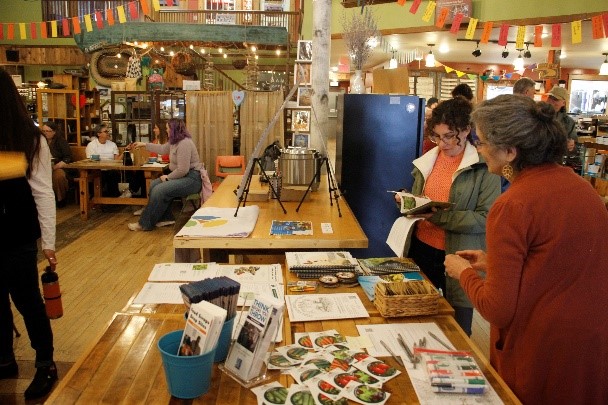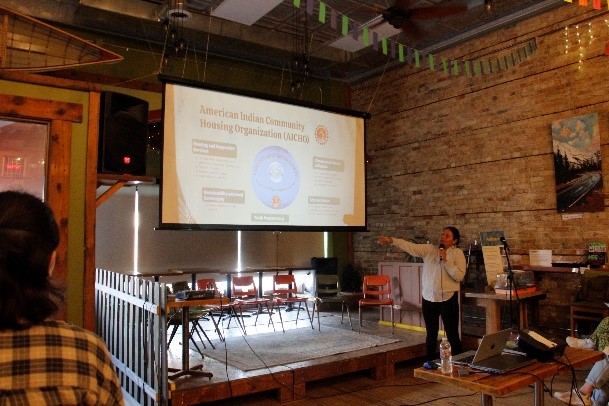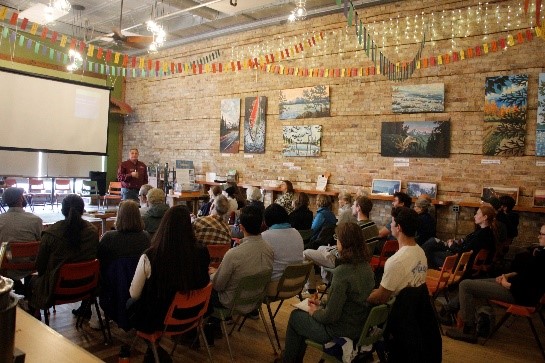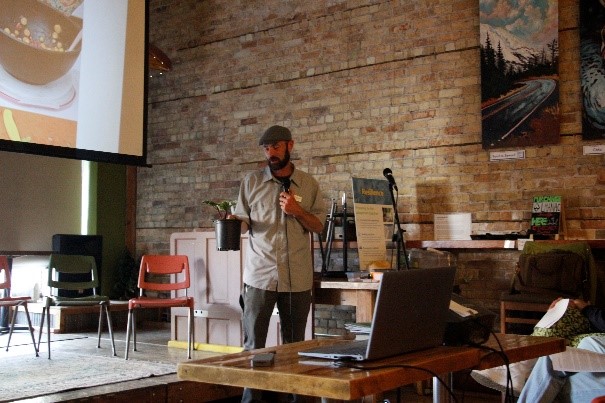Food Systems

Partnered with the Duluth Folk School, the City is hosting monthly workshops focused on sustainability. At our most recent event in May, over 45 people showed up to learn about food systems! Attendees heard from a wide variety of local experts on resources and programs related to gardening, agriculture, pollinators, and more! If you weren't able to attend, here's what you missed!
Our first presenter was Kayla Jackson with the American Indian Community Housing Organization (AICHO). She is currently the Food Sovereignty Director and Children’s Program Manager working with the Giinawiind Giginitaawigi'gomin program which gets middle and high-school aged youth to participate in indigenous cultural practices. AICHO provides many different services including housing and support, sustainability and food sovereignty, youth programming, arts and culture, and climate and cultural initiatives. She highlighted her work with the youth programs, which provide the opportunity for kids to get first-hand experience growing, producing, and marketing the products that they create! You can support AICHO by going to the Niiwin Market, or 4th Street Market, and purchasing their products. Currently, they are working on a big project at Morgan Park where they will be creating a cultural learning space, gardens, orchards, educational trails, and hosting farmers markets.


Next, we had a presentation from Troy Salzer with St. Louis County Extension. He helps anyone looking to improve their garden, small farm, large scale farm, or even just their yard. One thing that he is particularly interested in is pollinator gardens. Honeybees are wonderful for pollination, but in Minnesota we have so many more native pollinators that we must provide habitat for! These native pollinators need to have food all season long, so they can do their job. He encouraged the crowd to take part in No Mow May, along with planting trees, various native plants (such as white clover), or even an entire pollinator habitat in your yard. Along with advice for how to make your yard better for pollinators, Troy can aid with invasive species control, soil testing and interpretation, and community supported agriculture.

Then, we heard from Charlie Danielson, the Farm Manager of Ecolibrium3’s Urban Farm. Eco3 is committed to providing food and food education to the Duluth community. When talking about food insecurity, farmers are often forgotten about. But when Charlie asked the audience if have grown their own food, the majority of people raised their hand! We can make our food system more resilient by helping farmers and improving existing farmland. He brought up how we have stopped creating soil, mentioning that we have lost a third of our topsoil in his lifetime. Though there are many problems within the farming system, there are always ways to improve. At the end of his presentation, he brought out seeds from his daughter's basil plant. Attendees were able to plant basil seeds to be grown at Eco3. The Eco3 Urban Farm is located behind Lake Superior College, where he invites you to join them every Saturday from June 1st to October 15th

We finished the night with a panel featuring seven local community leaders in food systems.
David Abazs from Round River Farm and UMN Extension, supports agriculture throughout northeast Minnesota. He helps with community led work groups and supports numerous agricultural projects each year. He previously helped imagine and build an aquaponics facility along with numerous farms, and an agroecology center. Most recently he helped to create a giving garden. One thing he is passionate about is our ability to grow within and for our community. Research that Dave participated in showed that we can feed ourselves in Minnesota with only things grown within our region! Read more here.
Erin Loeffler from the Minnesota Board of Water and Soil Resources works as an Ecological Conservationist. She has recently been focused on pollinator conservation and biodiversity, which got going in 2019. She started Lawns to Legumes, which promotes urban landscape transition to native species and the conservation of our native pollinators. To complete a project like this, the BWSR provides a $400 reimbursement and has grants available for schools on pollinator education.
Kyle Hildebrandt from South St. Louis Soil and Water Conservation District provides access to natural resource and conservation services. He provides technical assistance for all thing’s natural resources, including erosion control and putting in pollinator habitats. Kyle can visit your home or land to do a free assessment to provide help with any erosion, flooding, or other problems. The SWCD also puts on a tree sale every year, which sold 40,000 trees last year.
Kayla Pridmore from Community Action Duluth works as the Seeds of Success Program Manager. Community Action Duluth works to increase food access across Duluth through a number of projects. She highlighted the Mobile Market, which is a grocery store on wheels. This market shows up in neighborhoods who need help accessing foods for any reason. They also run farmers markets, both the Lincoln Park and Central Hillside, starting up for the regular season on June 13th.
Gus Sinclair from Duluth Community Garden joined us. He works as the One Vegetable One Community Coordinator helping DCGP to create healthy neighborhoods. There are 21 community gardens throughout Duluth that are available to any community member. Garden plots are sold on a sliding scale so anyone can afford to grow. They also not only have tools for rent, but free food from plots managed by workers.
Shoreview Natives is a group that specializes in installing gardens that feature local and regional native plant species. Dan from Shoreview Natives talked about the importance of pollinator gardens, especially in urban settings. Shoreview Natives can help families with grants and massive pollinator planting projects, along with providing resources for getting started, and hosting workshops on how to do this in your yard.
Lorilee Blais has worked with Western Lake Superior Sanitary District (WLSSD) since 1996, and currently focuses on outreach and public education for recycling, waste reduction and organic waste recovery. In the region, between 14 and 20 percent of all waste is food waste. But this waste can go to other places, which is why compost drop sites were created. Sending your compost to an industrial facility means that they can compost many more food types than a person can in their backyard. Currently there are 10 sites, and more are in the process of being added.
Check out more of these helpful resources:
- BWSR Living Landscapes Initiatives
- Lawns to Legumes Program
- Habitat Friendly Solar Program
- Habitat Enhancement Landscape Pilot
- Clean Water Fund Projects
- Wetland Mitigation/Banking
- Forest Stewardship Planning
- Cooperative Weed Management Area Program
- Bee Lab – University of Minnesota
- Monarch Larva Monitoring Project
- Monarch Watch and Waystation Programs
- National Wildlife Foundation – Certified Wildlife Habitat
- Beyond Pesticides
- University of Minnesota Extension, Native Plants
- Minnesota Wildflowers
- Xerces Society
- BWSR Pollinator Toolkit
Duluth Community Garden Program Resources

Do you still have questions after this session? Come to our next session which will dive into the solar installation, energy storage and production, and financing, on Thursday, June 20th, 6-7:30pm!




